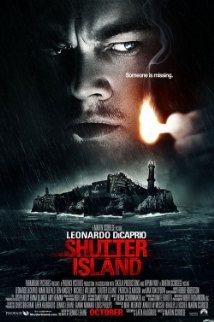“We Have Met the Enemy”

| None | Light | Moderate | Heavy | |
|---|---|---|---|---|
| Language | ||||
| Violence | ||||
| Sex | ||||
| Nudity |
What You Need To Know:
SHUTTER ISLAND demonstrates some masterful filmmaking, but, like many Martin Scorsese movies, it has significant flaws. The red herrings do not help the story. Some of the music and acting also detracts. That said, SHUTTER ISLAND keeps viewers on the edge of their seats, despite a depressing ending. Regrettably, the movie has a light humanist worldview with some pros and cons about God’s character and some politically correct, Anti-American revisionist history. There is also much foul language, horrific violent images, and excessive nudity.
Content:
(H, AB, B, PC, AP, RH, So, LLL, VVV, NNN, AA, DD, MM) Light humanist, depressing, nihilistic worldview with discussions that God loves violence, God’s gift is violence, rebutted by God gives us order, with murder and mayhem denying appeals to God and psychiatry failing too, plus strange politically correct, Anti-American, revisionist history references to the House on Un-American Activities Committee engaging in psychiatric experiments with analogies between Nazi Germany and the American government in the 1950s, but none of these political, psychological, spiritual musings seem to have any validity, and they turn out to be red herrings, and socialism is extolled; 45 obscenities and 26 profanities, plus arguments about God saying God’s gift is violence and God loves violence countered with appeals to God and statements that God loves order; constant references to violence and horrific aftermath of violence including Nazi general who shot himself and is shown several times with his head partially blown off and he’s still alive, woman who’s back is burnt badly, woman shot in stomach with lots of blood, children drowned, man with highly disfigured face from beating, doctor stabbed with syringe, and protagonist beats up two people; no sex but hugging and kissing; some shot of full male nudity and naked paintings of insane prisoners of the past and of naked women; much drinking and man is an alcoholic; tons of smoking and man given drugs; and, deception, paranoia, and psychobabble.
More Detail:
U.S. Marshall Teddy Daniels and his new partner, Chuck Aule, are summoned to an isolated, fortress-like psychiatric facility on Shutter Island to investigate the disappearance of a multiple murderer, a woman, from Ashcliffe Hospital. As Teddy investigates, it appears as if this is a cruel and inhuman psychiatric hospital. He learns from a former inmate that the House on Un-American Activities Committee was using the hospital to test psychotropic drugs on socialists. Then, he starts to realize they are giving lobotomies to people.
During his horrific investigations, especially of Ward C where the most hardened criminals are, Teddy becomes aware that everybody is against him and that he has been trapped on Shutter Island. He wants to save people, but can never quite do it. He keeps having visions of his dead wife, whom he believes died in a house fire set by the landlord. He also has visions of his time in Nazi Germany, where he liberated Dachau, the infamous concentration camp. He sees piles of Jews starved to death. One mother and daughter open their eyes and say, “Save me.” He stares at visions of the commandant who shot his jaw off in a botched suicide attempt. The woman murderer Teddy seeks evidently drowned her three children, so Teddy has visions of the daughter asking him to save her.
As in any good psychological drama, nothing is as it seems. Teddy’s investigation brings up questions of whether God loves violence or loves order. It brings up questions of whether psychiatry has any answers. And, it throws in red herring discussions of socialism and 1950s America at the height of the Cold War.
SHUTTER ISLAND demonstrates some masterful filmmaking, but, like many Scorsese movies, it has some significant flaws. The red herrings and blind alleys in the script do not help the story. The music and acting is over-the-top in a few places, suggesting the filmmakers thought this would add suspense, but instead they detracts from the movie. Finally, for those who understand plot structure, it becomes easy to see where the story is going by the second act.
That said, SHUTTER ISLAND does keep you on the edge of your seat. There are some real surprises. And, Ben Kingsley does a terrific job as Dr. ?. Also, the movie’s setting and mood are extremely powerful. Whatever its virtues, the ending is such a downer that it is hard to believe that anyone would like this movie, except for critics who like to revel in bad news. Scorsese has said this is his ode to Hitchcock, but Hitchcock always had true heroism, even when everything seemed to be set against the hero. SHUTTER ISLAND is the exact opposite.
Furthermore, the intense discussions of whether God loves violence and the nature of socialism and Cold War America will lead susceptible, uneducated people astray. For those who are discerning and informed, they will see that the sinfulness of man is the problem. And, since the filmmakers fall into that category, they suffer from the same human condition.


 - Content:
- Content: 







